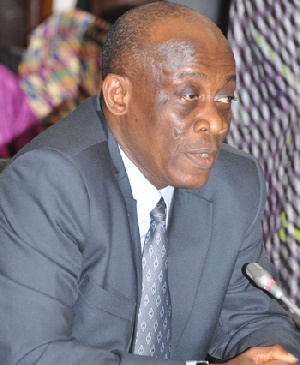Government is evolving a borrowing and investment strategy that will ensure the country does not relapse into heavily-indebted status, Seth Terkper, Minister of Finance and Economic Planning, has said. The new strategy will leverage private capital to finance public infrastructure investments and lessen the impact of government borrowing on the budget, he said.
“We’re not a government that will return the country to HIPC (heavily-indebted, poor status). We have a budget deficit that, admittedly, is high; but we know the causes and we’re tackling them. “That is why we have proposed an investment strategy that will put less stress on our debt. From this strategy, we will identify opportunities for the private sector to partner Government by investing in and managing some of our public infrastructure.”
Rapid build-up of the national debt, which climbed by 40 percent in 2012 alone according to the Bank of Ghana -- driven by a huge budget deficit and rising interest rates -- has fuelled criticism of Government nearly a decade after the country emerged from the Heavily-Indebted Poor Countries (HIPC) initiative. Since 2008, debt as a share of GDP has risen from 34 percent to 47 percent.
Mr. Terkper said Government aims to scale-down the fiscal deficit, which soared to a record 12.1 percent of GDP last year, and reduce direct borrowing for investments by isolating projects seen as commercial or self-financing in nature -- which will be developed using private capital in partnership with the state.
But there’s a need for financial deepening, he said, and when given the opportunity, the private sector must prove that it is more efficient than government at delivering the services.
Government also plans to increase the tenor of its bonds and create an infrastructure fund from the oil revenues to cut the reliance on short-term borrowing for investment, he said. Government’s three-month borrowing cost is more than 22 percent at present, drawing banks to T-bills at the expense of lending to businesses.
“We are in consultations with the World Bank and African Development Bank to get partial risk guarantees so that we can issue longer-tenor bonds. And since much of this borrowing is offshore, it will ease the liquidity pressure on the domestic market.
“The infrastructure fund that we have proposed will also assure the market that there’s a regular flow of funds to service the debt.”
With Ghana, which was upgraded to lower middle-income status in November 2010, facing dwindling access to grants from Western donors, the international capital market is set to become a more important source of external financing for Government, Mr. Terkper said.
This also means macroeconomic stability must be preserved and the national debt maintained at a “sustainable level” in order to boost the country’s credit ratings, he added.
In 2007, Ghana relied on positive assessments by ratings agencies to sell its debut US$750million Eurobond. But the country’s credit ratings have come under pressure recently, due to deterioration in the deficit.
Last month Fitch cut the outlook on Ghana’s B+ sovereign-debt rating from stable to negative, and warned of a possible downgrade if the fiscal situation does not improve dramatically. The Ministry of Finance has hinted it will consider refinancing the Eurobond, set to mature in 2017.
Business News of Wednesday, 20 March 2013
Source: B&FT
We won’t go HIPC - Terkper
Entertainment
















